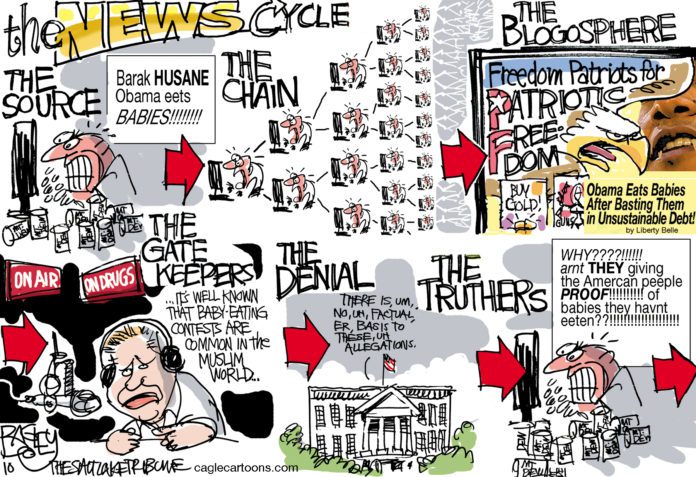BY GENE POLICINSKI
Journalists used to be easy to identify, in life, in the law – heck, even in the movies.
Not that many years past, journalists were the people carrying notebooks and pencils and maybe wearing a “Press” badge or card. They were newspaper reporters, magazine writers, and the occasional wire service correspondent.
On the big screen, they often wore a trench coat and almost always were “on deadline.”
Even when TV news came along, that new crop of journalists was easy to spot. They were the reporters trailed by a small crew equipped with cables, microphones and cameras. And there was a relatively small spectrum of local channels or national networks where they appeared.
Standing, literally and figuratively, behind both groups were brick-and-mortar buildings and businesses, staffed by a host of editors and news directors. There were courses of study at colleges, and professional groups with names that almost always included words like “newspaper” or “radio-television” – or even more plainly, “journalist.”
Then along came multiple outlets on cable TV and talk radio, and later 24/7 news channels. Identification got a bit tougher. Though the traditional groups still claimed the tag, there were new questions about “who is a journalist?” Did the host of a show focused on opinion, not reporting, qualify? [Think Bill O’Reilly, Rush Limbaugh, Keith Olbermann, Chris Matthews and others.] And what do you call someone who switches between news and entertainment? [Think Geraldo Rivera and Barbara Walters.]
Then came the Internet, where anyone can report, collect or opine on the news – and where some who do attract huge audiences that compare with or surpass traditional news operations. [Think Huffington Post and Matt Drudge.]
In one sense, none of that matters: The First Amendment includes no qualifiers when it mentions a “free press.” But such a broadly drawn concept of a journalist now regularly runs into trouble in courtrooms and legislative proposals, where it’s necessary to decide whether new media practitioners are or should be included.
The euphemistically named “Free Flow of Information Act” proposed in several recent sessions of Congress would extend “shield laws” for journalists to the federal level. The act would limit the conditions under which journalists must disclose news sources when subpoenaed in federal courts. Most states, through legislation or court decisions, now provide such legal protection to sources. The question of whether bloggers or free-lancers who publish work online should be included has proven a major roadblock to passage in the Senate.
Most recently, a federal district judge raised Internet eyebrows nationwide in ruling that Oregon’s shield law as applied to “journalists” would not protect a blogger sued for defamation. He ruled that the blogger did not meet the state’s definition. In the judge’s view, she failed because she had not attended a journalism school, didn’t work for a recognized news outlet, and had not operated according to professional journalism standards.
Not only did that decision strip this particular blogger of membership in the journalism club, but, more important, it also set up a lower legal standard to be met by those pursuing the defamation claim. And it removed a barrier to awarding higher damages.
Clearly, even within the traditional meaning, some online contributors are journalists. They work for local or national news operations, adhere to journalistic standards or customs, and make their living by doing such work.
But online enterprises of all kinds, shapes and sizes have opened up a new world of news and information, often as heavy on commentary as the Colonial-era journals of opinion and with audiences as limited as the neighborhood or as vast as the World Wide Web.
There’s one certainty in all this: Defining a “journalist” and therefore what constitutes a free press can no longer fairly depend on appearances, education or employment, on the manner of distribution or the size of circulation or audience.
A once-glib response to the “who” question has been: “You are a journalist when you say you are.” Add in the requirement of a clear intent to inform others, and such a simple – and free speech-, free press-friendly – definition of an old profession just might fit best in the Internet Age.
– Gene Policinski is senior vice president and executive director of the First Amendment Center, 1207 18th Ave. S., Nashville, Tenn., 37212. Web: www.firstamendmentcenter.org. E-mail: gpolicinski@fac.org. His columns appear occasionally in The Oklahoma Observer.








